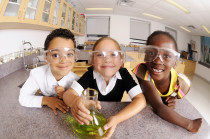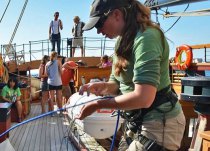When a child is an infant they learn by reactive learning: to pick things up and either sort them out for storage, throw them away in the trash or recycle. By the time they are 13, their minds have already determined if they will be environmentally inclined or have other interests.
Today, we find the Earth (since 1914) to be plunged further in peril, more so than ever before. People of all ages and walks of life have become complacent or anesthetized to our earth’s environment and what goes on around them. People state that they do not see a problem and it’s getting better with technology, and they do not believe the science or dismal history patterns. This is properly termed as “Environmental Apathy”.
How can this be corrected? One step in the process is to provide a knowledge base and education to others. Here in the United States there are about 50 thousand primary schools that have some sort of environmental education outside of the required science and earth science programs. More can be done.
Students that are in K – 12 grades, administrators and teaches, parents as well as local businesses have to become actively involved in the process. It is a process of Communication, Cooperation and Collaboration. This is in part an online program to apply to public, private, charter, religious and even home school programs. It is presented where not student is left inside.
A knowledge based program developed around earth science, progressing to environmental science and ecosystem dynamics, agriculture; just to name only a few out of 90 topics. The need to develop after school programs and environmental clubs is essential. Each grade can then become a building block as vocabulary and terms are learned and projects can be done according to grade level modules online and in the classroom.
Programs to be developed are according to a given schools geographical location and the area’s needs. For example: a west coastal are like Santa Barbra, California would not share the same program criteria as that of a desert area like Phoenix, Arizona, or even an east coastal area like Portland, Maine.
Environmental education and activities foster self-esteem, problem solving & working skills, social skills, communication, cooperative work ethics through collaboration, appreciation, accountability, good stewardship, citizenship and much more.
It is reasonably believed that schools can learn to become green, promote such new environmental education goals. Students should have the chance for more environmental scholarships, and other awards. Schools and their valuable teachers involved in this process should also be eligible for awards.
Please see our publiction entitled "Arizona Education On The Environment K-12 Innitiative".





